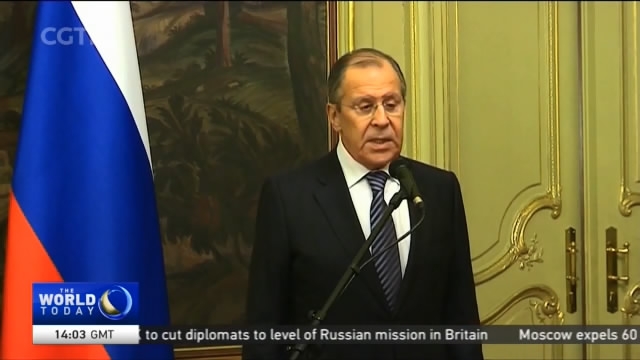
22:24, 30-Mar-2018
Russia Diplomatic Row: Kremlin says UK forcing the West to follow anti-Russia course

Moscow is accusing the UK of pushing an anti-Russia stance in the stand-off over the poisoning of a former spy. The Kremlin announced a tit-for-tat response to the expulsion of its diplomats from two dozen countries. It ordered out 60 American diplomats and is shutting down the US consulate in St Petersburg. Julia Lyubova has more from the Russian capital.
It came as little surprise when Russia ordered 60 US diplomats to leave Russia by 5th April and the closure of the US consulate in St Petersburg. It's a tit-for-tat response to Washington expelling 60 Russian diplomats and closing the Russian consulate general in Seattle earlier this week. But Moscow has warned this is not the end of it.
SERGEY LAVROV RUSSIAN FOREIGN MINISTER "We will not only react, so to speak, reactively, to what the Anglo-Saxon axis is doing towards us, forcing everyone to follow down an anti-Russian path. We want to establish the truth."
The Russian Foreign Minister accuses Great Britain of 'forcing everyone to follow an anti-Russian course'. It comes after 24 countries expelled over a 100 Russian diplomats in solidarity with the United Kingdom over the poisoning of former Russian spy Sergey Skripal and his daughter in Salisbury on 4 March. It's the largest diplomatic action against Russia since the Cold War, unprecedented in scale. And some analysts say Russia and the West are heading for a new Cold War-style confrontation.
ANDREY FYODOROV POLITICAL ANALYST "We are now facing a confrontation. I call it a 'cool war', cool war at the gate of Cold war. It's quite clear that in foreign policy fields, in many cases, especially on Donbass, Ukraine, etc., Putin cannot give in. He cannot say 'no, I agree with the demands of the West'. It's impossible, absolutely impossible for him."
Britain says the chemical used in the attack on Skripals was part of a group of nerve agents developed by the Soviet Union known as 'Novichok'. Russia continues to deny any responsibility for the attack.
JULIA LYUBOVA MOSCOW Russia's defence from the start of this diplomatic row was that it never received a sample of the nerve agent or saw any evidence to prove Russian responsibility. While tests by the Organisation for the Prohibition of Chemical Weapons may take some time, Moscow says it is seeking a meeting with leaders of the organisation to 'establish the truth'. JL, CGTN, Moscow.

SITEMAP
Copyright © 2018 CGTN. Beijing ICP prepared NO.16065310-3
Copyright © 2018 CGTN. Beijing ICP prepared NO.16065310-3